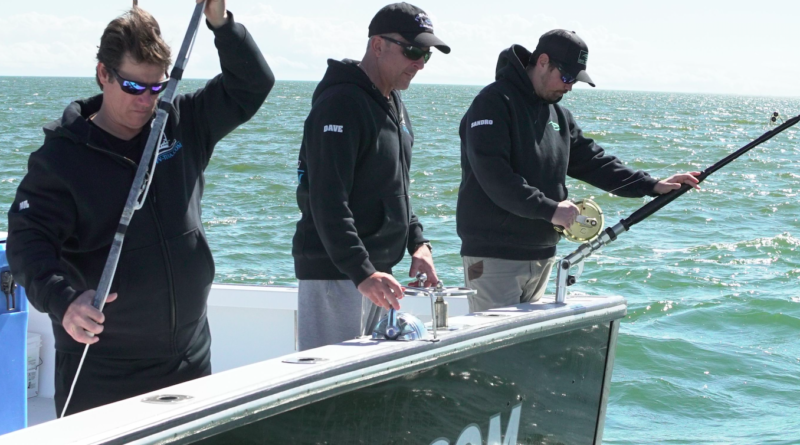INTERVIEW: Dave Carraro joins ‘Wicked Tuna: Outer Banks’ for the first time
Photo: Dave Carraro, middle, fishes off the coast of North Carolina on Wicked Tuna: Outer Banks. Photo courtesy of Nat Geo / Provided by press rep with permission.
The Wicked Tuna franchise on National Geographic has been going strong for nearly 10 seasons, supplying viewers with a variety of intense competitions on the open waters as anglers leave the harbor of Gloucester, Massachusetts, and journey for the big tunas of the deep blue sea. A successful spinoff series, Wicked Tuna: Outer Banks, has the fishers plying the waters off North Carolina for bluefin gold, but they need to watch out because these choppy seas are known as the Graveyard of the Atlantic.
Captain Dave Carraro of the FV-Tuna.com boat has won the Gloucester competition an unprecedented five times, according to press notes, and this season he is making his maiden voyage on Wicked Tuna: Outer Banks. Audience members can catch his adventures, along with the stories of the other anglers, Sundays at 9 p.m. on the network.
“It’s not what I like; it’s what I don’t like,” Carraro said in a recent phone interview about the Outer Banks. “The inlet is something I don’t like. It’s just very challenging. I don’t have the local knowledge. It’s a very dangerous place; however, I do love the style of fishing down there. I love chasing the fish. As opposed to sitting up here and waiting for them in Gloucester, we go looking for them down there, and we’re trolling, which is something I love to do, something completely different than we do up here. It’s just a change of pace. It’s nice — different scenery, different styles of fishing and different people, nice people.”
To film this season of Wicked Tuna: Outer Banks, Carraro had to take his boat from Gloucester to North Carolina, a 600-mile journey each way. When he stepped foot on this barrier island and started to plot his course for the television show, it was his first time in OBX in 25 years.
“The inlet going out and coming back in is very challenging because the big waves, the breakers on the sandbar, and it’s about a half mile stretch of water we have to cross both ways,” he said. “On the way out, you’re worried about blowing out your windows, and on the way back in you’re worried about rolling the boat over. Definitely challenging for the local boats, and even more challenging for myself who does not have that local knowledge, definitely some scary moments going out and coming in that inlet for sure. In addition lots of fish caught down there for all of the boats, a lot of big fish and a lot of rough conditions on many days.”
Carraro said he liked the competition of the Nat Geo series, but he simultaneously loves focusing on just hooking the fish, which he is often able to do with jaw-dropping results. Pulling in tuna nearing 1,000 pounds is a regular occurrence in his life. His fishing took a more professional and serious tone when he moved from New Jersey to Gloucester more than two decades ago.
“The fishing in New Jersey just started to dwindle a little bit, and I knew I wanted to tuna fish for as long as my body allows,” he said. “And I just simply decided one day to pick up and move my whole entire operation up here to Massachusetts. This is pretty much the capital of giant bluefin tuna fishing up in the New England area. This is the place to be. New Jersey just started to dwindle there. The fish stopped showing up. It really got very slow. I just wanted to chase the fish, and I’ve been up here now for 23 years.”
Carraro is not exaggerating when he talks about the toll fishing has taken on his body. He admitted that his joints sometimes hurt with the constant pounding of the boat and being on his feet all day long. He needs to constantly bend and sway with the rocking and rolling of the waves.
“It’s a lot on your body mentally,” Carraro said. “We’re out there sometimes not just a day but two-three day trips, and basically all you get is little cat naps here and there. It’s very challenging on your body both mentally and physically. … Right now I’m pretty good. When my body tells me that’s enough, that’s when I’ll stop. I stay healthy. … I’m going to go on my 30-mile bike ride. I try to eat right. I try to stay in top shape as best I can.”
When Carraro is not competing on Wicked Tuna or Wicked Tuna: Outer Banks, he’s taking his boat out with charter customers. From April 15 to Christmas, he is heading out on the waters off Gloucester, searching out the big fish, and his clients often come back to the harbor with big smiles.
“We do about 125 to 150 charters a season,” he said. “In addition, when we’re not doing that, we’re filming the television show Wicked Tuna up here in Gloucester, so the only time I do not have paying customers on my boat is when we’re filming Wicked Tuna up in New England. … Today we released a 450-pound fish. Yesterday we had two fish, a 300 and a 750, and the day before we had a 450 and an 800. So it’s been very good. We’ve been getting one to two fish a day, and that’s with our charters.”
By John Soltes / Publisher / John@HollywoodSoapbox.com
Wicked Tuna: Outer Banks, featuring Dave Carraro, airs new episodes Sundays at 9 p.m. on National Geographic. Click here for more information.

